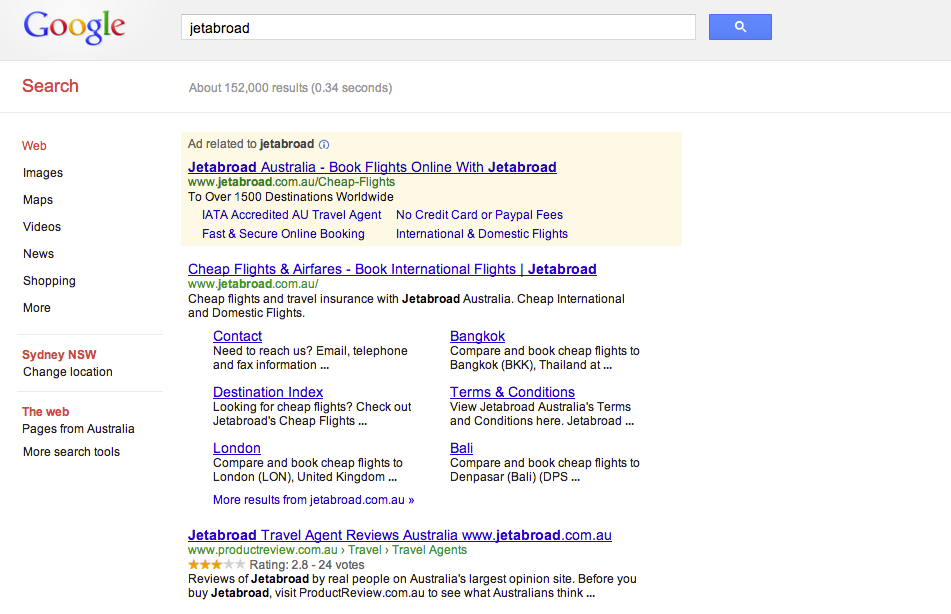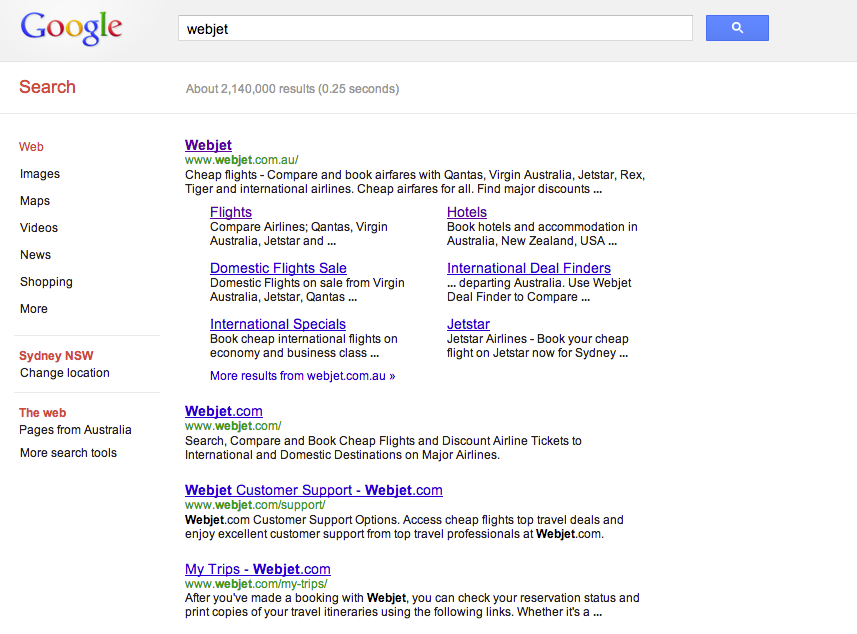Brand Ads and Branded Keywords: Worth It?
Loves Data"I'm already in position #1 for organic search for my brand name—should I even bother spending extra money with AdWords to advertise my brand?" It's a very common question many advertisers ask, especially from small and medium-sized businesses whose AdWords budget may be very limited. And the answer is generally yes, but you'll have to determine if your branded campaigns are effective for your business. I'll show you how in a moment.
First, let's take a look at two examples from the online flight comparison space.
JetAbroad.com.au are in position #1 for both organic search and AdWords:

Screen Shot 2012-11-20 at 2.03.14 PM
Webjet.com.au, on the other hand, choose not to advertise for their brand name, leaving only their #1 organic listing:

Screen Shot 2012-11-20 at 2.02.28 PM
The obvious advantage of advertising your brand name is that these keywords will almost always do very well, with a high CTR, low average CPC and high conversion rate. As a result, they will usually increase both traffic and conversions.
However, some advertisers might understandably be reluctant to bid on their brand. It may seem that, with a #1 organic listing, someone searching for your brand will find you anyway. Bidding on your brand name might then feel like paying for traffic that you'd get for free.
Despite this, there are many scenarios where businesses benefit from advertising their brand:
1. Unfortunately, not every business is in fact in position #1 in Google organic search results for their brand name. Sometimes a business might have a similar brand to a much larger competitor in another industry, and sometimes there are other issues that prevent a business from ranking for its name. In this case, AdWords is an invaluable tool in capturing branded traffic and conversions.
2. With AdWords it's much easier for a business to control its messaging, as well as the exact ad parameters such as the exact destination URL (in instances where you might want traffic to go on a special offer page instead).
3. There are many AdWords ad extensions that can be plugged into an ad. Some of these (ie: sitelinks) can be found in your organic listing but aren't directly editable. Others (ie: click-to-call) are not displayed on organic search results at all.
4. With AdWords, you have full control over the timing of your ads. This makes it possible to set up branded campaigns with scheduling for different promotions relating to a day of the week, a given date or even a specific time period. None of this is possible with just an organic listing.
5.Your competitors might be using AdWords to bid on their brand already. Assuming this does not infringe on any trademarks, these ads represent leakage points that funnel out potential customers. Having a second way that customers can reach your site can reduce the leakage.
6. Finally, some leakage is probably occurring even if there are no competitors in the search results. Having an organic and a paid listing increases your chances of catching website visitors.
If you're still skeptical, you might wish to compare two close time periods: one where the branded ads were shown and one where they were paused. If you are differentiating between AdWords and organic traffic in Google Analytics, you can estimate the marginal cost increase of having the ads:
Period
Organic Visits
Organic Conversions
Paid Visits
Paid Conversions
Total Conversions
Total Cost
Week 1 [ads paused]
5000
500
0
0
500
$0
Week 2 [ads showing]
4000
400
2000
200
600
$750
Of course the comparison is not perfect and the data can never be 100% accurate, but it is possible to use a similar table to see trends. In the above case, for a marginal investment of $750, the total conversions increased by 100. Therefore, the branded campaign is actually getting additional conversions that would not have been achieved with organic listings alone, at $7.50 each. From this, businesses can make individual decisions on whether a branded campaign is worth it.
If you are considering doing this analysis, you might like to take a look at Google's own pause research which suggests that even if your organic listing is number one, 50% of paid search clicks are incremental (full details here). Of course this is a meta-analysis aggregating many advertisers and industries and might differ for your particular case.


Comments